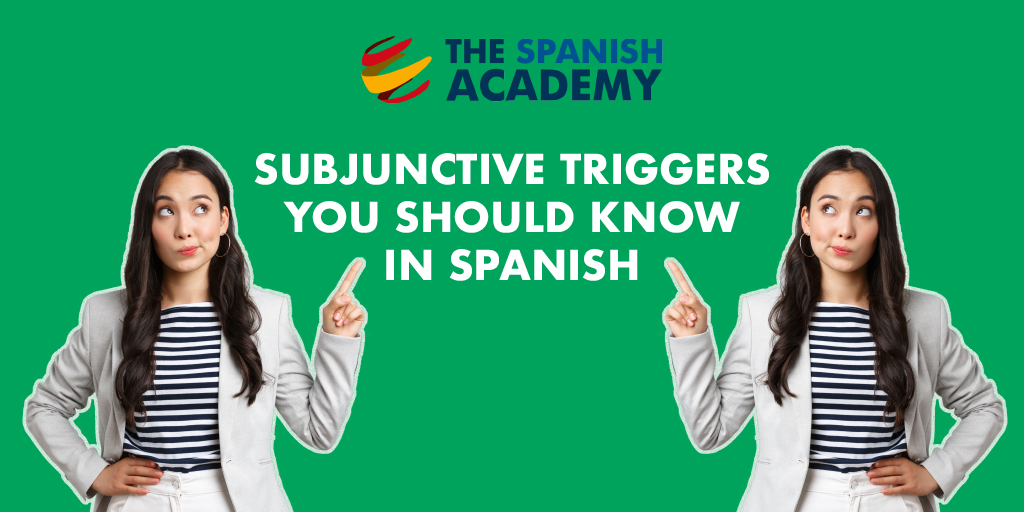We are presenting the subjunctive triggers in Spanish you must know. Make sure you jot them down and use them in your next Spanish conversation.
The use of subjunctive is a key element in any conversation among Spanish native speakers. Unlike in English, subjunctive is the core mood in any day to day conversation, which comes in natural to Spanish speakers.
Learning subjunctive is probably the scariest moment in your Spanish learning journey.
If you are taking Spanish for IB or our Spanish for adults courses, you will need to familiarise with the use of subjunctive and its triggers.
Also, we would lie if we tell you it is easy to learn subjunctive in Spanish. It takes time and a lot of practice to be able to use subjunctive like native speakers do. Don’t trust any teacher claiming to teach you the fast way.
Nonetheless, here are some shortcuts to learn the subjunctive mood in Spanish. Learning these subjunctive triggers in Spanish* will help you utilise them in different ways. Thanks to them you will very likely sound as fluent as native Spanish speakers.
¿Estás listo/a? ¡A tope con el subjuntivo! 💪
Expressing wishes and claims
Here, the first subject wishes something from another subject. This will always trigger subjunctive after the “que”, as you can read in the examples.
Quiero que + subjuntivo. (To want that …)
Example: “Quiero que aprendas el subjuntivo.” (I want you to learn subjunctive).
Espero que + subjuntivo. (To wish that …)
Example: “Espero que aprendas el subjuntivo.” (I hope that you learn subjunctive).
Exijo que + subjuntivo. (To require …)
Example: “Exijo que aprendas el subjuntivo.” (I require you to learn subjunctive).
Expressing need
You don’t use subjunctive when you express your need for something (Necesito aprender el subjuntivo).
However, you need to use subjunctive when you need someone to do something. Different subjects are involved in the sentence.
Necesito que + subjuntivo. (To need …)
Example: “Necesito que aprendas el subjuntivo.” (I need you to learn subjunctive).
Expressing future event, still to happen
Whereas other triggers exist to be used when expressing future events which haven’t yet happened, you should know these two easy formulas.
Cuando + subjuntivo. (When … )
Example: “Cuando aprendas el subjuntivo, podrás hablar español mejor.” (When you learn subjunctive, you will speak Spanish better).
Antes de que + subjuntivo. (Before …)
Example: “Aprenderás a hablar en pasado antes de que aprendas el subjuntivo. (You will learn speaking in the past before you learn subjunctive).
Expressing interest and feelings
Careful! Like mentioned above, you don’t use subjunctive when expressing your own interest and feelings for yourself -> “Me interesa aprender el subjuntivo”. (I’m interested in learning subjunctive).
But it is required to use subjunctive when a different subject produces the feeling or interest to you (Me interesa que aprendas el subjuntivo <<< It interests me that you learn subjunctive.)
Hence, the subject of the verb with subjunctive (“aprendas”), not the person who experiences the interest or feeling (“me interesa”).
Also, there are plenty of verbs you can use to express feelings which will be subjunctive triggers in Spanish (encantar/to love, molestar/to annoy, fascinar/to fascinate, horrorizar/to horrify, hacer ilusión/to thrill, poner nervioso/to make you nervous, dar miedo/to scare …).
Find below some of the most commonly used for your reference. You can always contact us to get a full list and more tips about the use of them, 🙂
Me interesa que + subjuntivo (It is interesting …)
Example: “Me interesa que aprendas el subjuntivo” (The fact that you learn subjunctive is interesting to me).
Me pone nervioso que + subjuntivo (It makes me nervous …)
Example: “Me pone nervioso que aprendas el subjuntivo” (The fact that you learn subjunctive makes me nervous).
Me molesta que + subjuntivo (It annoys me …)
Example: “Me molesta que aprendas el subjuntivo” (The fact that you learn subjunctive annoys me).
Expressing valuations
Here is a very popular subjunctive trigger formula. All our IB students reach full confidence to face their exams and being able to provide a wide array of formulas after practicing them in class.
You can definitely express valuation in Spanish on any given topic if you have great vocabulary and can conjugate subjunctive properly.
Es + “adjetivo” que + subjuntivo (It is + “adjective” that …)
Although the list of adjectives triggering subjunctive is very large, the following are the most common ones:
Importante – Important
Necesario – Necessary
Imprescindible – Essential
Bueno – Good
Ridículo – Ridiculous
Examples: “Es importante que aprendas el subjuntivo” (It is important that you learn subjunctive). “Es necesario que aprendas el subjuntivo” (It is necessary that you learn subjunctive). “Es imprescindible que aprendas el subjuntivo” (It is essential that you learn subjunctive).
Don’t hesitate to contact us and get a full list of many more adjectives triggering subjunctive.
*We have assumed you are already familiar with the conjugation of the subjunctive present in Spanish. If not, you can always drop us a message and we will make sure any of our teachers explains all you need to get you started with subjunctive.
Also, you may want to check our favourite Spanish handbooks publisher website to choose the most suitable learning book for you.
Or you can also ask us for the best advice and plan your private Spanish classes accordingly.
Take a look and drop a few comments in your favourite posts, 🙂




